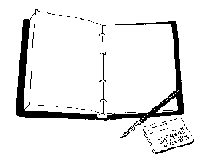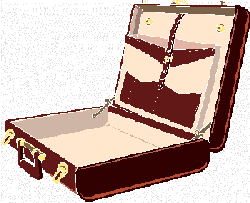Last Updated: May 28, 2006
INFORMATION ABOUT
SMALL CLAIMS MATTERS
![]()
Almost all adults at some point find themselves involved in a dispute with someone over a relatively small amount of money. For example, you might have a problem with a department store that won't refund money to you for a defective item or you might want to collect the money for a small hospital bill incurred when you fell over your neighbor's bike or you might want to sue a dry cleaner who won't pay you for clothing he damaged. If you can't settle the matter between yourselves or by using Mediation, and the amount in dispute is small, then you will probably choose to sue in Small Claims Court.
We hope that the questions and answers presented here will assist you in familiarizing yourself with small claims matters. While the material below attempts to answer common questions in this area, State and local laws may significantly modify the facts set forth. Because all legal problems are unique, nothing provided here is a substitute for the advice of competent counsel. We strongly urge you to consult with an attorney licensed to practice in your state about any particular legal problem you may have.

WHAT IS SMALL CLAIMS COURT?
![]() "Small
Claims Court", also known as Municipal Court" or "District
Justice Court," is a court where individuals and businesses are permitted to sue
stores, contractors, insurance companies, other businesses and other
individuals quickly and inexpensively. The person suing is the
"plaintiff" or "claimant" and the person being sued is the
"defendant." Small Claims Courts hear contract claims, property
damage disputes and decide cases involving automobile accidents. These courts
handle cases where the amount in dispute is less than a certain amount of
money, such as $5,000 or $10,000. Call the local Small Claims Court in
advance to see what the limits are, to decide in advance whether
to you may to sue there or, whether you must use a different part of the court system.
"Small
Claims Court", also known as Municipal Court" or "District
Justice Court," is a court where individuals and businesses are permitted to sue
stores, contractors, insurance companies, other businesses and other
individuals quickly and inexpensively. The person suing is the
"plaintiff" or "claimant" and the person being sued is the
"defendant." Small Claims Courts hear contract claims, property
damage disputes and decide cases involving automobile accidents. These courts
handle cases where the amount in dispute is less than a certain amount of
money, such as $5,000 or $10,000. Call the local Small Claims Court in
advance to see what the limits are, to decide in advance whether
to you may to sue there or, whether you must use a different part of the court system.
DO I NEED A LAWYER?
![]() Small
Claims Court is set up so that you are able to sue without a lawyer. However, depending
on the local rules, sometimes corporations must by law be represented by a
lawyer.
Small
Claims Court is set up so that you are able to sue without a lawyer. However, depending
on the local rules, sometimes corporations must by law be represented by a
lawyer.
HOW DO I FILE MY CASE?
![]() Small Claims Court
Small Claims Court  cases are usually filed in person in the
Small Claims Court where either the defendant is located or where the
transaction or event which gave rise to your claim occurred. If you don't know
where to file, look in the blue pages of that county's telephone directory. You
will need to know whether the business is a corporation, partnership or sole
proprietorship. When you go to file, bring copies of any documents you have
about your matter. For example, written contracts or agreements, insurance
policies, dry cleaner slips, etc. These documents normally are attached to your
claim. Make sure you have copies of any documents for your own file. You will
be asked to pay a filing fee, the amount of which varies depending on the
amount of your claim and the number of people you are suing. Remember to
include a demand that the defendant pay you for the out-of-pocket expenses you
have incurred to sue, including the cost to file the claim itself. You will be
told of the trial date, normally scheduled within a few months of the date you
first filed your "Complaint" or "Statement of Claim." The
Small Claims Court will tell you when you file, and whether you are responsible
for sending the defendant a copy of the Complaint by mail or whether the
Sheriff will be serving the defendant.
cases are usually filed in person in the
Small Claims Court where either the defendant is located or where the
transaction or event which gave rise to your claim occurred. If you don't know
where to file, look in the blue pages of that county's telephone directory. You
will need to know whether the business is a corporation, partnership or sole
proprietorship. When you go to file, bring copies of any documents you have
about your matter. For example, written contracts or agreements, insurance
policies, dry cleaner slips, etc. These documents normally are attached to your
claim. Make sure you have copies of any documents for your own file. You will
be asked to pay a filing fee, the amount of which varies depending on the
amount of your claim and the number of people you are suing. Remember to
include a demand that the defendant pay you for the out-of-pocket expenses you
have incurred to sue, including the cost to file the claim itself. You will be
told of the trial date, normally scheduled within a few months of the date you
first filed your "Complaint" or "Statement of Claim." The
Small Claims Court will tell you when you file, and whether you are responsible
for sending the defendant a copy of the Complaint by mail or whether the
Sheriff will be serving the defendant.
WHAT HAPPENS AFTER I FILE?
![]() If
you are responsible to
If
you are responsible to  serve the defendant, bring
the green certified mail return receipt card with you to the trial to prove the
defendant received notice of the lawsuit. Make sure you tell your witnesses the
date the trial is scheduled in enough time for them to arrange time off from
work or so they can get babysitters.
serve the defendant, bring
the green certified mail return receipt card with you to the trial to prove the
defendant received notice of the lawsuit. Make sure you tell your witnesses the
date the trial is scheduled in enough time for them to arrange time off from
work or so they can get babysitters.
WHAT SHOULD I EXPECT TO HAPPEN AT THE TRIAL?
![]() You
and your witnesses should meet in court in advance of the scheduled time for the
trial. Bring with
You
and your witnesses should meet in court in advance of the scheduled time for the
trial. Bring with  you four copies of any documents or
photographs you need to prove your case. One is for the Judge, one is for the other side,
one is for the witness and one is for you. Address the judge as "Your
Honor" and stand up when speaking to the judge. If the defendant does not
show up, most judges will give you a "default judgment." This means
that you win without doing anything. However, most of the time the other side
shows up and you must put on your case. The judge should allow you to make a
short "Opening Statement," if you wish. In your opening statement,
tell the judge what you expect to prove during the trial. You will then put on
your side of the case by testifying yourself and asking your witnesses
questions to prove your version. This is called "direct examination."
The other side will be permitted to cross-examine you and your witnesses by
asking questions about the statements made. The defendant will then introduce
his or her witnesses and you may cross-examine them. At the end, you are
generally permitted to make a "Closing Statement," which summarizes
your side of the case. Sometimes the judge will render a decision immediately
and other times you will receive notice of it in the mail.
you four copies of any documents or
photographs you need to prove your case. One is for the Judge, one is for the other side,
one is for the witness and one is for you. Address the judge as "Your
Honor" and stand up when speaking to the judge. If the defendant does not
show up, most judges will give you a "default judgment." This means
that you win without doing anything. However, most of the time the other side
shows up and you must put on your case. The judge should allow you to make a
short "Opening Statement," if you wish. In your opening statement,
tell the judge what you expect to prove during the trial. You will then put on
your side of the case by testifying yourself and asking your witnesses
questions to prove your version. This is called "direct examination."
The other side will be permitted to cross-examine you and your witnesses by
asking questions about the statements made. The defendant will then introduce
his or her witnesses and you may cross-examine them. At the end, you are
generally permitted to make a "Closing Statement," which summarizes
your side of the case. Sometimes the judge will render a decision immediately
and other times you will receive notice of it in the mail.
IF A DEFENDANT LOSES IN SMALL CLAIMS COURT, WILL HE OR SHE HAVE TO PAY COURT COSTS OR ATTORNEY'S FEES?
![]() Court
costs are almost always assessed against a Defendant who loses in court.
Attorney's fees, however, are a different matter. Attorney's fees will only be
assessed to the loser if there is a prior agreement between the parties that
the loser pays for such fees or if the particular law that was violated has a
provision for payment of attorney's fees. Other than these two situations, each
side is usually responsible for its own attorney's fees.
Court
costs are almost always assessed against a Defendant who loses in court.
Attorney's fees, however, are a different matter. Attorney's fees will only be
assessed to the loser if there is a prior agreement between the parties that
the loser pays for such fees or if the particular law that was violated has a
provision for payment of attorney's fees. Other than these two situations, each
side is usually responsible for its own attorney's fees.
WHAT HAPPENS AFTER THE TRIAL IS OVER?
![]() After
the Judge decides the case, either side may appeal, usually within the following
twenty or thirty days. Each local place has its own rules regarding the amount
of time to appeal. You must inquire about the number of days you have to do
this. If the defendant has not paid the judgment and has not appealed, you may
then file a paper with the court asking the Sheriff to sell property that the
defendant owns to pay for the debt.
After
the Judge decides the case, either side may appeal, usually within the following
twenty or thirty days. Each local place has its own rules regarding the amount
of time to appeal. You must inquire about the number of days you have to do
this. If the defendant has not paid the judgment and has not appealed, you may
then file a paper with the court asking the Sheriff to sell property that the
defendant owns to pay for the debt.
DESSEN, MOSES & ROSSITTO is happy to assist you in any legal matter that involves either Pennsylvania or New Jersey, the two states in which our attorneys routinely practice. If you wish to contact us for more information concerning this field of law or any other in which we practice, please send us an E-mail message and we will be happy to try to assist you.
![]()
LINKS TO OTHER INTERESTING INFO
![]()
Top of Page | DM&R Home Page
| Legal Article Wall
About DM&R | To Retain
DM&R | Ask Us A Question
![]()
Copyright © 1996 -
2006 Dessen, Moses & Rossitto
All rights reserved.



